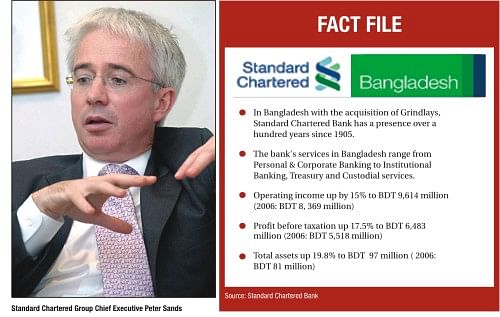Bangladesh needs to invest in education, infrastructure

Bangladesh has a huge potential for wealth creation but the country needs to invest in education and infrastructure, and develop deeper connections with the international economy, says Standard Chartered Group Chief Executive Peter Sands.
In an interview with The Daily Star on Tuesday, Sands said Bangladesh is often under-estimated but 'there is a huge potential for wealth creation' and turning the nation into a middle-income country by 2025 is a 'doable aspiration'.
The chief executive of the Standard Chartered board since 2006, Sands was in Dhaka on a brief tour of South Asia.
Sands said the building blocks for a good economy is to build stable institutions and political framework, good education system, a culture that is open and confident about the rest of the world.
But he did say there are a number of 'massive challenges' the country has to overcome to achieve that level of income.
"I would like to see democracy, further economic reforms in certain sectors, and greater investment in education," he said, sitting at the plush new headquarters of Standard Chartered Bangladesh in Gulshan.
Sands also stressed 'greater internationalisation', with more Bangladeshi companies exploring opportunities overseas and more international companies being attracted here.
He also said that he would like international companies to start seeing Bangladesh as a country with a great talent pool and that is what Bangladesh can be known for.
Unfortunately, Bangladesh has suffered from a media focus on issues such as floods, the government and the business community could do more to focus on achievements, he said.
Bangladesh's biggest asset is its people, but greater numbers have to be educated.
"Education has to be a huge priority. It can lead to enormous growth if Bangladesh make use of opportunities overseas," he said.
Asked about Bangladesh's economic prospects in a volatile world market, Sands said "Fortunately, Bangladesh is not as exposed to the sectors that are likely to get hit by the US slowdown." He explained that the most immediate casualties of the US economic slowdown are sectors associated with the housing market.
He added Bangladesh is positioned relatively well because of the diversity of its export destination and large readymade garment exports, as "The clothing market is resilient" as people always need clothes.
But, Sands warned, "The broader issue is that if the US slows down, nobody is immune."
He also said Asian countries are far better placed to meet this crisis as there were greater risks taken in the mortgage markets in the US and Britain.
"Although the average growth rate might come down as an effect of the US slowdown, but the economies will not get derailed," Sands added.
The CEO also said one of the main concerns for the global market is inflation, while the world should not expect 'quick relief' from the rising oil and food prices.
Sands said greater international exposure would be 'beneficial' for the Bangladeshi economy, with Bangladeshi industries such as readymade garments industry doing well internationally despite tough competition.
Business confidence is also important that helps countries reach out to international markets as well locally accepting international competition, according to Sands.
He said SCB tries to make two types of acquisitions geographic and network capabilities to expand their network and access, as one of the bank's biggest "Assets is our international network."
The recent acquisition of American Express's Bangladeshi operation is an example of SCB trying to expand its scale of operation and its capabilities to tap a greater market.
Asked how the bank has managed to grow in tough financial times, Sands said that he main driver of the bank's strategies is rapid organic growth which is investing in the bank's core areas and in own resources and capabilities, including new branches and new banking products.
A large part of it, Sands says, is also spent identifying and developing the next generation of leadership within the bank who can turn opportunities into real business.
This 'organic growth' Sands says, has accounted for 80 percent of the bank's income growth.
Having a massive international network of branches in 70 countries, staffed by professionals from more than 115 nations, has helped SCB become the largest international bank in India, with the bank's income growing by 60 percent last year in India alone.
This has been done largely through helping India's irrepressible march into the global market and rolling the Indian market out to external investors. Sands said, SCB could play a similar role of a 'facilitator' in Bangladesh.
He also said that SCB's success has come from sticking to its strengths, which is a focus on markets in Asia, Middle East and Africa which has been the source of 90 percent of its profits.
He also cited the long-standing relationship with South Asia, with the bank celebrating the 150th anniversary of its branch in Kolkata this week
Sands also warded off any concerns regarding SCB's banking vulnerabilities similar to troubled banks in North America and Europe.
"Standard Chartered is a conservative bank," he said, adding most banks did not understand the risks they were taking.
He added that most banks were not properly pricing risk and the shock to the financial system would continue for 'some time'.

 For all latest news, follow The Daily Star's Google News channel.
For all latest news, follow The Daily Star's Google News channel. 



Comments